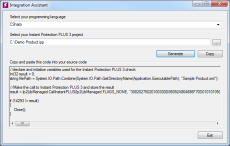
Various sample applications are available to help show how the Instant Protection PLUS 3 DLL may be integrated into an application. The documentation for the samples walks you through how the samples were created step-by-step. These sample applications can be found in the default installation directory C:\Program Files (x86)\SoftwareKey\Instant PLUS\samples\IP2Lib DLL\Samples.
| Sample | Description |
|---|---|
| CSharp | C# Windows Application |
| Java | Java Console Application for Windows |
| LabVIEW | LabVIEW 64-bit Application |
| MFC using Early Binding | A Visual C++ MFC application linking the Instant Protection PLUS 3 DLL via early binding. |
| MFC using Late Binding | A Visual C++ MFC application linking the Instant Protection PLUS 3 DLL via late binding. |
| C++ CLR using Late Binding | A Visual C++ CLR application linking the Instant Protection PLUS 3 DLL via late binding. |
| Microsoft Access | Microsoft Access Database Application |
| Microsoft Excel | Microsoft Excel Workbook Application |
| VB.NET | VB.NET Windows Application |
| LabVIEW | LabVIEW Application |
| Delphi | Delphi Application |
The Instant Protection PLUS 3 Integration Assistant can be used to help generate the proper code to add to your application. It currently supports C++ via early binding, C++ via late binding, C#, VB.NET, Access VBA, and Excel VBA. The code is also described in the above sample topics.
For the Visual C++ MFC samples, we offer one version which uses Early Binding and another which uses Late Binding (or Implicit Linking and Explicit Linking, respectively). Early binding is where your C++ program is compiled and linked with an import library when you compile/build it. Doing this will result in your program failing to start if the DLL is not present. Late binding, on the other hand, allows you load and unload the DLL while your application is running (instead of when the application is starting up). Microsoft has this MSDN article, which offers a good overview on the differences between the two and insight on how to determine which is best for you. Generally, Early Binding (or Implicit Linking) is what we would recommend.